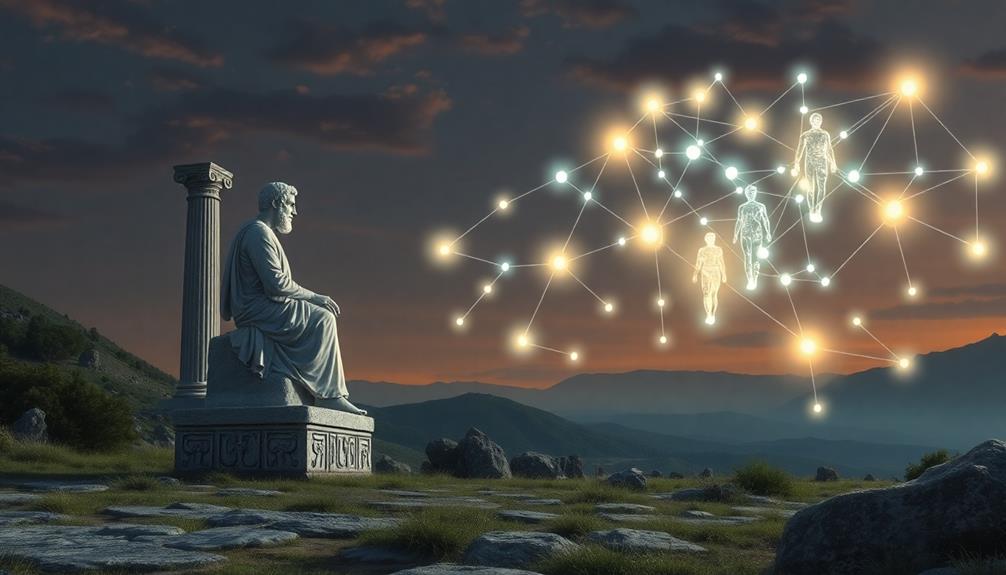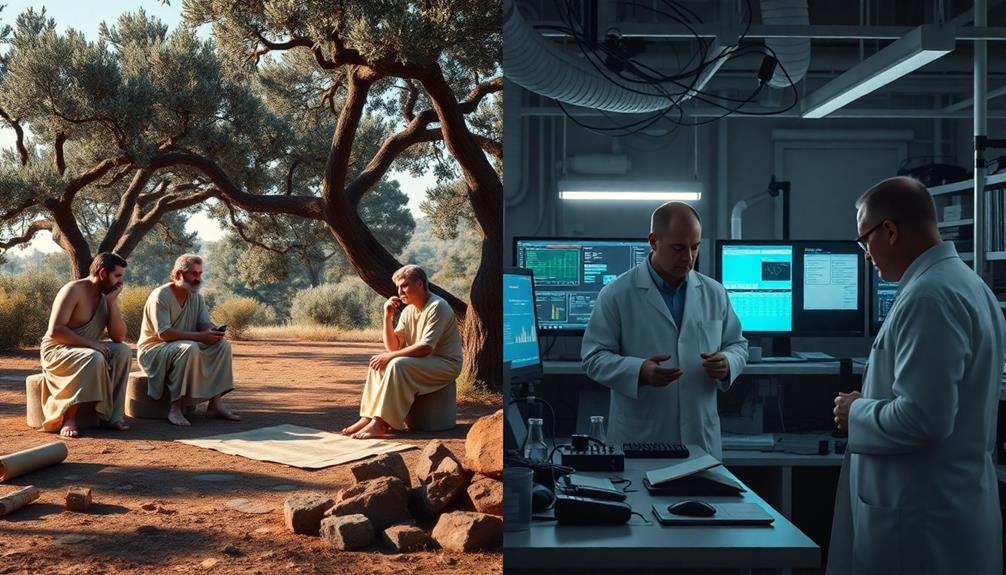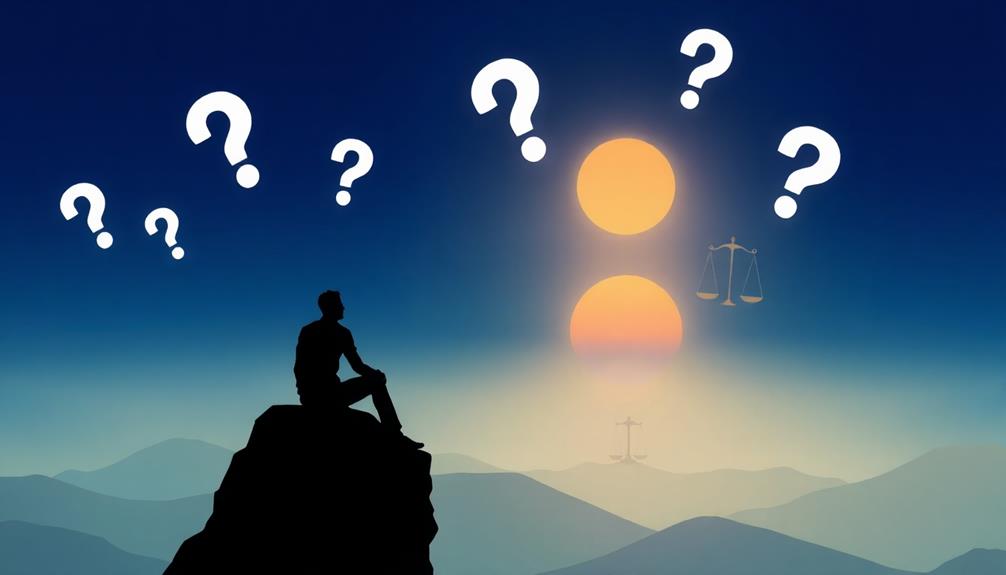Plato didn't predict the internet directly, but his philosophical ideas resonate deeply with today's digital landscape. He emphasized the pursuit of truth and knowledge, key elements that echo in our current struggle against misinformation. His Allegory of the Cave illustrates how people often mistake shadows for reality, mirroring how online narratives can distort perception. Plato's vision of philosopher-kings aligns with the need for knowledgeable leaders in our media-saturated world. His insights on education and critical thinking remain essential now. If you explore further, you'll uncover how these concepts can help you navigate the complexities of modern information.
Key Takeaways
- Plato's emphasis on truth and knowledge mirrors the modern need for discernment in the information-rich digital landscape of the internet.
- The Allegory of the Cave highlights the risk of mistaking misinformation for reality, relevant to today's internet users encountering false narratives.
- Plato's philosopher-kings concept advocates for knowledgeable leadership, paralleling the necessity for informed voices in the era of social media.
- Misinformation's rapid spread online reflects Plato's concerns about manipulation and ignorance, emphasizing the need for education and critical thinking.
- Plato's insights on ethical governance and the pursuit of truth remain crucial as society navigates the complexities of digital communication and information flow.
Plato's Philosophical Framework

Plato's philosophical framework offers a profound exploration of truth and knowledge, fundamental for fostering a just society. He believed that understanding the ideal forms—the true essence of things—was essential for individuals to grasp what's genuinely real. In an age where trusting instincts can safeguard against emotional pain, this understanding isn't just an abstract pursuit; it directly impacts how you engage with the world around you.
In a society where misinformation thrives, recognizing truth becomes even more critical. Plato's concept of the tripartite soul—reason, spirit, and appetite—reflects the internal conflicts you might face in maneuvering today's digital landscape. Each part of your soul influences your online behavior, shaping how you process information and respond to differing perspectives.
His advocacy for an educated ruling class, particularly the philosopher-king, emphasizes the necessity of informed leadership, especially in an age where falsehoods can easily overshadow truths. As you consider the complexities of the digital age, Plato's critique of democracy resonates. It highlights the challenges of discerning credible information amidst the noise of social media and fake news.
Ultimately, his philosophical insights urge you to seek truth actively, fostering a more just society through informed decision-making.
The Allegory of the Cave

In exploring the depths of truth and knowledge, the Allegory of the Cave presents a powerful metaphor for understanding perception and reality. Imagine prisoners confined in a dark cave, watching shadows dance on a wall. They mistake these shadows for the only reality they know. On one hand, this illustrates how easily perception can be manipulated. When one prisoner escapes and discovers the outside world, they face a painful journey of enlightenment. This struggle reflects our modern battles with misinformation, where it's easy to accept illusions as truth.
| Shadows on the Wall | True Forms Outside |
|---|---|
| Limited perception | Expanded awareness |
| Comfort in ignorance | Discomfort of truth |
| Acceptance of illusions | Quest for knowledge |
| Fear of the unknown | Embrace of reality |
Plato emphasizes the importance of education and philosophical inquiry. Without critical thinking, society remains trapped in ignorance, much like those prisoners. The allegory warns us about the dangers of relying solely on sensory experiences, akin to today's information overload. Ultimately, it urges you to seek deeper knowledge and understanding in a world rife with misleading narratives.
Knowledge and Misinformation

Today, countless individuals navigate a digital landscape flooded with information, where distinguishing fact from fiction can feel overwhelming. Plato's insights into knowledge and misinformation resonate strongly in our current age. Just as he illustrated in the Allegory of the Cave, many are trapped in an area where perceptions are manipulated, leading to distorted realities.
The recent Microsoft outage highlighted how cybersecurity vulnerabilities can exacerbate the spread of misinformation and confusion. Here are some key points to reflect on:
- Misinformation spreads rapidly through social media, echoing Plato's concerns about sophists profiting from confusion.
- The coexistence of truth and falsehood online complicates public discourse, affecting critical discussions on significant issues like climate change.
- Unverified information can undermine credible sources, making it tough for you to discern reliable knowledge.
- Plato championed an educational system focused on the pursuit of truth, a principle that remains important as we confront digital misinformation.
In this environment, it's critical to cultivate critical thinking skills and seek reliable knowledge. By doing so, you can navigate the complexities of the internet and engage meaningfully in discussions, just as Plato would have hoped for a society grounded in truth.
Democracy and Information Flow
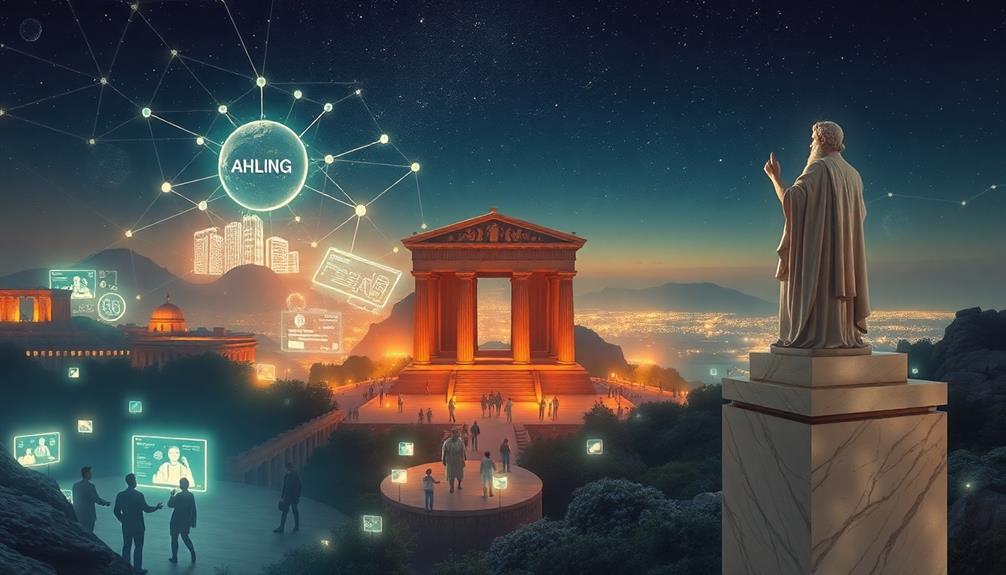
Amidst the vast digital landscape, the flow of information can be both a blessing and a curse for democracy. While freedom of speech is a cornerstone of democratic ideals, it also opens the door to misinformation. Plato warned us about the manipulation of perceptions by sophists, which mirrors today's challenges with fake news and distorted narratives online.
You might recall Plato's allegory of the cave, where individuals mistake shadows for reality. This is strikingly similar to how users can be misled by misleading information. As you navigate through social media, discerning credible sources becomes increasingly difficult.
Here's a quick look at the relationship between democracy and information flow:
| Aspect | Challenge | Solution |
|---|---|---|
| Freedom of Speech | Misinformation | Promote media literacy |
| Information Access | Overwhelming data | Curate credible sources |
| Public Discourse | Polarization and division | Encourage respectful dialogue |
Plato's vision suggests we need expert intervention to prioritize truth, fostering a healthier democratic discourse in this information-saturated age.
The Role of the Philosopher-King

How can we affirm that leadership serves the common good rather than personal interests? Plato's concept of the philosopher-king offers a compelling framework. He believed that rulers should possess wisdom and knowledge to make decisions that benefit society as a whole.
Here's how the philosopher-king model emphasizes this:
- Wisdom and Knowledge: Only those who understand the Forms, particularly the Form of the Good, should govern.
- Moral Character: Leaders are selected based on both intellectual abilities and their ethical compass.
- Philosophical Education: The best leaders are educated in philosophy, enabling them to discern truth from falsehood.
- Structured Hierarchy: Plato advocates for a governance system where knowledge and rationality, rather than mere popularity, guide authority.
In Plato's ideal state, the philosopher-king embodies the belief that enlightened leadership is essential for societal well-being.
This model contrasts sharply with contemporary democratic ideals, where equal voice often overshadows the need for expertise.
Ethical Implications of Technology

As you explore the ethical implications of technology, consider how misinformation shapes public discourse and influences your beliefs.
Virtue ethics plays an essential role in guiding technology development, urging you to think about the impact of your choices on society.
Additionally, reflect on the power dynamics at play, as control over information can greatly affect individual autonomy and collective well-being.
Misinformation and Public Discourse
Misinformation has become a pervasive issue in our digital age, leading to significant ethical implications for public discourse.
Just as Plato warned about the dangers of false perceptions in his Allegory of the Cave, we now face a similar challenge. The rise of social media has amplified this problem, making it easier than ever for misinformation to spread.
This situation underscores the importance of establishing topical authority to guarantee that credible information prevails. Here are four key concerns:
- Distortion of Reality: Misinformation can blur the line between truth and illusion, complicating your understanding of issues.
- Equal Weighting of Opinions: Democracy's commitment to free speech raises ethical questions about treating credible and false information as equals.
- Public Policy Obfuscation: Misinformation obscures truths, making it difficult for policymakers to engage in meaningful discussions.
- Educational Needs: Plato emphasized the importance of prioritizing truth through education, a lesson that's essential today to combat misinformation.
Virtue Ethics in Technology
While technology has the potential to enhance our lives, it also raises significant ethical dilemmas that demand our attention. Plato's concept of virtue ethics offers a valuable framework for steering through these complexities. By cultivating moral character and wisdom, you can make more informed decisions about how to use technology ethically.
Consider Plato's division of the soul into reason, spirit, and appetite. This framework helps you understand how technology shapes your motivations and decisions. For instance, social media can amplify your desires for approval, often distorting your perception of truth.
To combat misinformation, embracing the pursuit of truth—one of Plato's cardinal virtues—is essential. By fostering critical thinking and discernment, you can better navigate the digital landscape and resist the lure of fake news.
Plato advocated for philosopher-led governance, emphasizing that ethical standards in technology should involve informed and wise individuals. As a technology user, you play a role in this process. By embodying virtue ethics, you can contribute to a more ethical digital environment, ensuring technology serves to enhance, rather than undermine, our shared values.
Power Dynamics and Control
In your exploration of technology's ethical landscape, it's clear that power dynamics and control play a significant role in shaping our experiences. Reflecting on Plato's insights, you might reflect on how the digital domain mirrors ancient concerns about knowledge and deception. Here are four key aspects to ponder:
- Misinformation: Just as sophists manipulated perception, online misinformation distorts reality, raising political questions about accountability.
- Free Speech: The internet facilitates unregulated discourse, echoing Plato's warning that this can blur the lines between credible and non-credible information, undermining democratic values.
- Expertise: Plato advocated for an educated elite; similarly, today's discussions emphasize the need for experts to navigate technology's ethical implications and combat misinformation.
- Akrasia: The addictive nature of digital platforms often leads to akrasia, where you might act against your better judgment, influenced by social media's pull.
These dynamics reveal how technology can empower and control, creating a landscape where ethical considerations are crucial for maintaining a balanced political discourse.
Understanding these power structures is essential for fostering a more informed and responsible digital society.
Social Media and Perception
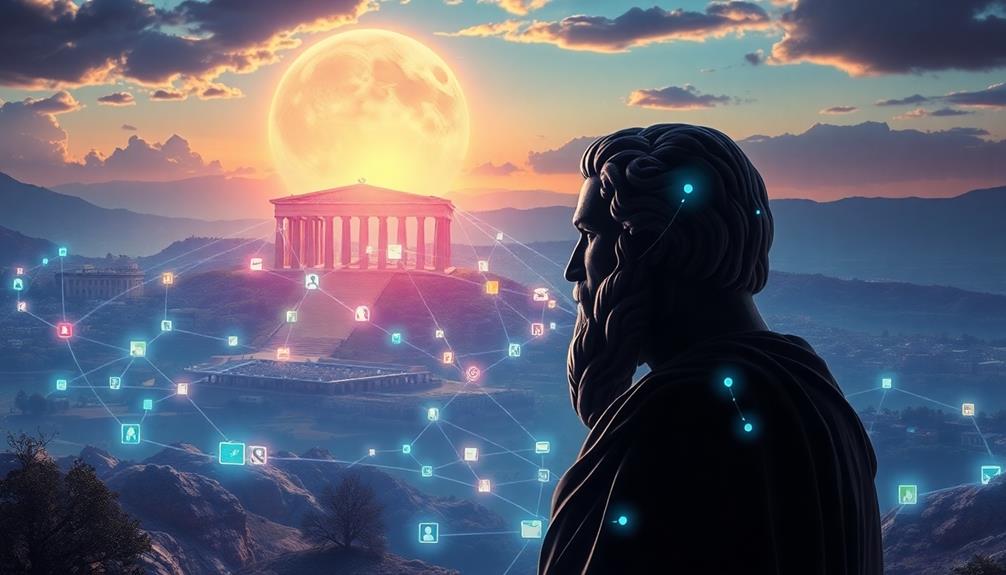
You see how social media shapes your perception, often blurring the lines between reality and curated content.
Misinformation spreads rapidly, influencing your beliefs and decisions in ways you mightn't even realize.
Understanding these dynamics is essential if you want to navigate the complex landscape of information today.
Misinformation Amplification Dynamics
Misinformation spreads like wildfire on social media, distorting perceptions and shaping public opinion in alarming ways.
Plato's allegory of the cave perfectly illustrates how you might mistake shadows—misinformation—for reality. The dynamics of misinformation amplification today echo his warnings about sophists manipulating truths for profit.
Consider how misinformation thrives in our digital landscape:
- Rapid Spread: Studies show misinformation can spread six times faster than the truth.
- Equal Footing: Democratic values promoting free speech allow falsehoods to rival credible information.
- Real-World Consequences: Events like the Pizzagate incident highlight the dangers of misinformation, leading to violence fueled by conspiracy theories.
- Influencers' Role: Modern social media influencers often amplify misleading information for personal gain, reflecting Plato's concerns about profit-driven narratives.
These elements create a complex web of misinformation that challenges the very foundations of the history of political thought.
Without critical thinking and discernment, you may find yourself trapped in a digital cave, mistaking shadows for the truth.
Perception Shaping Mechanisms
The power of social media to shape perceptions is both profound and unsettling. Just as Plato illustrated in his *Allegory of the Cave*, many of us are often misled by shadows—curated content and misinformation that distort our understanding of reality. In today's digital age, the rapid spread of misinformation mirrors the tactics of ancient sophists, manipulating perceptions for profit. This situation creates challenges in discerning truth, where democratic values can inadvertently elevate false narratives alongside credible information.
The echo chambers prevalent on social media reflect Plato's concerns about societal justice and individual virtue. When you and others become entrenched in your biases, you might lose sight of objective truths. To combat these pervasive effects, Plato's idea of an educated elite guiding society towards truth resonates strongly today, underscoring the importance of media literacy.
| Mechanism | Impact on Perception | Plato's Political Insight |
|---|---|---|
| Curated Content | Distorts reality | Shadows in the cave |
| Misinformation | Spreads rapidly | Sophists manipulating truth |
| Echo Chambers | Reinforces biases | Poorly informed populace |
| Democratic Values | Elevates false narratives | Risks to societal justice |
| Media Literacy | Promotes critical thinking | Guidance towards truth |
The Search for Truth

In today's digital landscape, countless individuals grapple with the challenge of discerning truth from illusion. Plato's Allegory of the Cave serves as a poignant reminder of this struggle, as people often mistake shadows—misinformation—for reality.
To navigate this complex terrain, consider these four key strategies:
- Cultivate Media Literacy: Equip yourself with the skills to critically analyze sources and understand the context behind the information.
- Seek Authoritative Voices: Just as Plato advocated for philosopher-led governance, look for experts in the field who can provide credible insights.
- Engage in Continuous Learning: Embrace education as a lifelong journey, fostering a love for truth similar to Plato's vision.
- Challenge Democratic Values: Recognize that while democracy promotes free expression, it can also blur the lines between truth and falsehood.
Plato's Vision of Governance

In Plato's vision of governance, philosopher-kings play a vital role, ruling with wisdom and knowledge instead of mere power or wealth.
You'll see how this idea connects to the need for educated leaders who can discern reality from illusion, especially in today's world filled with misinformation.
Philosopher Kings' Role
At the heart of Plato's vision for governance lies the concept of philosopher kings, leaders who possess the wisdom and knowledge essential for ruling justly. Unlike ordinary politicians driven by self-interest, philosopher kings prioritize the welfare of citizens, ensuring a harmonious and equitable society.
Here's what sets them apart:
- Education: Philosopher kings undergo rigorous training in philosophy and ethics, equipping them to discern truth from falsehood.
- Pursuit of Truth: Their commitment to understanding the greater good fosters a leadership style that values knowledge over populism.
- Ethical Rulership: By placing ethical considerations first, these leaders create policies that genuinely benefit society rather than serve personal agendas.
- Critique of Democracy: Plato warns that without knowledgeable leaders, societies may fall prey to misinformation and populist movements.
In a world increasingly influenced by information technology, the philosopher king's role becomes even more vital.
Their unique insight could guide societies through the complexities of the digital age, ensuring that governance remains focused on truth and the collective good.
Embracing Plato's vision could lead us toward a more enlightened future, where leadership and wisdom go hand in hand.
Knowledge and Governance
Effective governance hinges on the depth of knowledge possessed by its leaders, a principle central to Plato's vision. He believed that only philosopher-kings, educated in wisdom and philosophy, could make informed decisions that benefit society.
In "The Republic," Plato emphasizes that knowledge is essential for just governance, contrasting it with the chaotic nature of democracy, where misinformation thrives. Socrates asks how rulers can discern truth from falsehood, highlighting the need for enlightenment and education.
Plato's allegory of the cave illustrates this vital view of perception, suggesting that without proper education, people remain trapped in shadows, unable to grasp true knowledge. This insight resonates today, as misinformation proliferates in the digital landscape.
Moreover, Plato's concept of a mixed constitution advocates blending democratic elements with expert rule, echoing modern discussions about the role of informed voices in governance. He underscores the importance of an educational system focused on truth, which aligns with the current need for media literacy and critical thinking skills.
In a world where information spreads rapidly, Plato's vision reminds us that knowledgeable leadership is essential for steering through the complexities of governance effectively.
Reality vs. Illusion
Plato's insights into knowledge and governance naturally lead us to explore the tension between reality and illusion in his vision. His Allegory of the Cave reminds us of our tendency to confuse shadows for truth, a phenomenon that's all too familiar in today's digital landscape.
Just like the prisoners in the cave, you might find yourself grappling with misinformation online. Here are some key points to reflect on:
- Illusions in Information: The internet can distort reality, making it hard to discern truth from falsehood.
- Governance Challenges: Plato's ideal "just city" faces threats from false narratives that manipulate public perception.
- The Role of Education: An education system that nurtures a love for truth is essential, echoing today's need for media literacy.
- Wisdom in Leadership: Governance by philosopher-kings highlights the importance of informed leaders who can navigate the complexities of information.
In this age where sophistry can easily spread, it's important to seek out wisdom and expertise. By understanding the reality behind the illusion, you can better engage with the world around you.
Lessons for the Digital Age

In steering through the complexities of the digital age, we can draw valuable insights from ancient philosophical concepts. Plato's Allegory of the Cave serves as a powerful reminder that we often mistake shadows—misinformation—for reality. This resonates with today's challenges, where fake news can distort our understanding. To combat this, we need digital literacy programs that help us discern credible information from false narratives.
Moreover, Plato's idea of akrasia highlights our struggle with biases, which can skew our judgment online. Recognizing this weakness can empower you to seek out diverse perspectives and make informed decisions.
The tension between freedom of speech and the spread of falsehoods, a concern for Plato, is painfully relevant as social media grapples with content moderation.
Lastly, Plato envisioned philosopher-led governance, which invites us to contemplate the role of experts in today's information landscape. We must advocate for knowledgeable voices to guide public discourse, ensuring that the integrity of information prevails.
Frequently Asked Questions
What Was Plato's Vision?
Plato's vision emphasizes the pursuit of truth and knowledge, advocating for an educated society led by wise leaders. He warns against illusions and misinformation, stressing the importance of critical thinking and discernment in understanding reality.
What Did Plato Believe About Reality?
Plato believed reality's divided; you've got the physical world you perceive and a higher domain of true Forms. Only through philosophical reasoning can you escape ignorance and grasp the essence beyond mere appearances.
What Is Technology According to Plato?
According to Plato, technology's a tool for pursuing truth and enhancing society. You should recognize its potential dangers, understanding that it must align with moral values and philosophical insight to truly benefit humanity.
What Did Plato Discover?
Plato discovered profound insights about reality, knowledge, and society. He challenged you to question perceptions, emphasizing the importance of seeking truth through education and the pursuit of wisdom, shaping your understanding of justice and governance.
Conclusion
In reflecting on Plato's insights, it's clear he didn't predict the internet, but he certainly anticipated its challenges. Just as the shadows in the cave mislead, today's digital landscape can distort truth. Are we not all, at times, prisoners of our screens? To navigate this maze, we must embrace the philosopher-king's wisdom, seeking clarity amidst chaos. By doing so, we can transform our online experiences into genuine pathways of knowledge, rather than mere distractions.
